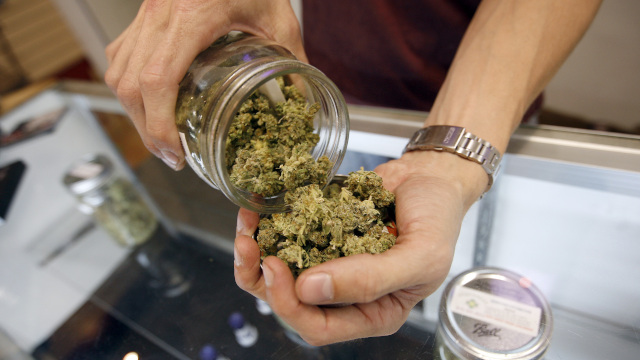Duzy said the effort has been led by a core group of 10 to 15 volunteers, backed by a statewide network that now numbers 500 volunteers.
Another marijuana legalization initiative was rejected by 53.5 percent of state voters in 2010. Several similar measures, including one sponsored by Duzy and Jolson, were proposed in 2012, but none qualified for the ballot.
But the two men said they are optimistic this time.
"I'm optimistic because of the enthusiasm we're getting from people who want this legalized," Duzy said.
"We honestly feel this plant can help transform and sustain humankind," said Jolson, who said he wants to see industrial hemp legalized as a biomass fuel as well as marijuana decriminalized for personal and medical use.
Duzy said that while most pro-marijuana organizations in California decided to wait until the 2016 ballot, his group decided to go ahead with aiming for 2014.
"Put it to the people and let the people decide," he said.
The two proponents said they hope to use a combination of as many as 3,000 volunteers and, if they can obtain donor funding, professional signature-gatherers to collect the needed signatures.
Last year, voters in Colorado and Washington state approved initiatives legalizing recreational use of marijuana.
Federal laws criminalizing marijuana make no exception for such laws, or for the medical marijuana laws now in effect in about 20 states, including California.
But last month, the U.S. Justice Department announced a policy change, saying it will ease off enforcing federal laws in states that allow the use of small amounts of marijuana, as long as those states have "strict regulatory schemes" of their own in place.
Instead, said Deputy U.S. Attorney General James Cole, Justice Department prosecutions will focus on eight law enforcement priorities in states where marijuana is legal.
Those priorities include keeping marijuana out of children's hands; preventing marijuana operations from being used as a cover for sales of illegal drugs; keeping revenue from going to criminal enterprises; preventing violence and gun use in marijuana growing and sales; and protecting public health, Cole said in a memo to federal prosecutors.
Duzy and Jolson said their efforts to legalize marijuana in California go back to the 1990s, predating the Colorado and Washington votes and Justice Department policy change.
But Jolson said the recent events show "a momentum going across America" that he hopes will help propel the California initiative to victory.
In California, the four regional U.S. attorneys, including Melinda Haag of San Francisco, announced a law enforcement effort in 2011 to crack down on medical marijuana dispensaries they considered to be large-scale commercial enterprises.
One such case is Haag's effort to shut down the Harborside Health Center in Oakland, the state's largest dispensary, through a civil lawsuit to forfeit the landlord's property. The case is on hold while a federal appeals court considers the city of Oakland's bid to fight the forfeiture through its own lawsuit.
After Cole issued his memo on Aug. 29, Haag said through a spokeswoman that the cases filed in Northern California thus far by lawyers in her office appear to meet the guidelines and that "we do not expect a significant change."
See KQED's coverage of cannabis and the legalization of marijuana here.

